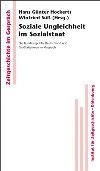Completed research project
With policies on poverty, this project looks at a fundamental function of the welfare state that became increasingly important from the crisis of the Keynesian full-employment welfare state in the 1970s onwards. This challenge confronted all European welfare states in a similar way. Their responses were shaped by the varying significance of social inequality in the respective political culture, the resilience to poverty of the social security systems and differing economic contexts. For the purpose of contrasting such differences, the research project chose to compare West Germany and the United Kingdom and examined policies on poverty along three main axes: from the perspective of social history, the study looks at the development of income inequality and group-specific, different risks of impoverishment.
A perspective of historical discourse focused on different forms of perception and definition of poverty in science, the public sphere and politics. A perspective of political history investigated policies on poverty as part of the crisis management of welfare states. In terms of research strategy, it was a question of outlining the last third of the twentieth century as a period of upheaval in modern industrial societies and linking approaches of social history with the history of the modern welfare state.
Publications:
- The Rediscovery of Poverty in Post-Boom West Germany, in: Lutz Raphael (Hg.), Poverty and the Welfare State in Modern German History, New York/Oxford 2016, S. 197-224
- Soziale Ungleichheit im Sozialstaat. Großbritannien und die Bundesrepublik im Vergleich, München 2010 (hg. zus. mit Hans Günter Hockerts).
- Vom Rand in die Mitte der Gesellschaft. Armut als Problem der deutschen Sozialgeschichte 1961-1989, in: Ulrich Becker/Hans Günter Hockerts/Klaus Tenfelde (Hg.), Sozialstaat Deutschland. Geschichte und Gegenwart, Bonn 2010, S. 123-139.
- Armut im Wohlfahrtsstaat, in: Hans Günter Hockerts/Winfried Süß (Hg.), Soziale Ungleichheit im Sozialstaat. Die Bundesrepublik und Großbritannien im Vergleich, München 2010, S. 19-42.
- Massenarbeitslosigkeit, Armut und die Krise der sozialen Sicherung. Großbritannien und die Bundesrepublik im Vergleich, in: Thomas Raithel/Thomas Schlemmer (Hg.), Die Krise der Arbeitsgesellschaft 1973-1989. Die Bundesrepublik Deutschland im europäischen Kontext, München 2009, S. 55-66.


